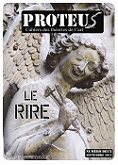Humour et anarchie — le rire cruel d’Antonin Artaud
Abstract
 Télécharger l’article
Télécharger l’article
Paru dans : Proteus n°2

La conception de l’humour d’Antonin Artaud est marquée par sa modernité : elle est fondée sur l’effacement des frontières entre sujet et objet, marquée par un psychisme archaïque et pulsionnel, par sa familiarité avec la folie. Rendant manifeste le caractère aléatoire de l’ordre des choses qu’il accuse, l’humour chez Artaud se charge d’un pouvoir dissociatif et anarchique. C’est à partir des films des Marx Brothers que, dans Le Théâtre et son Double, Artaud développe sa conception d’un « humour-destruction ». L’humour subversif de ces films, qui met à mal les normes et les structures établies pour laisser apparaître le chaos, est emblématique de son concept d’un humour qui rétablit un stade de l’être originaire dans lequel la scission de l’homme et du monde trouve sa résolution dans l’extase.
Mots-clés : cinéma — Le Théâtre et son double — subversion — destruction — chaos
Modernity left its imprints on Antonin Artaud’s concept of humor: it is founded on the idea of dilution of the boundaries between subject and object; it is marked by archaic and libidinal psyche, by familiarity with madness. Letting appear the contingency within the order of things, humor, with Artaud, finds itself associated with a dissociative and anarchic power. It is around the Marx Brothers’ movies that, in Le Théâtre et son Double, Artaud develops his conception of a “destructive humor”. The humor of these movies that subverts the norms and gives place to chaos is in fact emblematic of Artaud’s concept of humor: within chaos an original state of being is reestablished in which the scission between the human being and the world finds its resolution in ecstasy.
Keywords : cinema — Le Théâtre et son double — subversion — destruction — chaos








